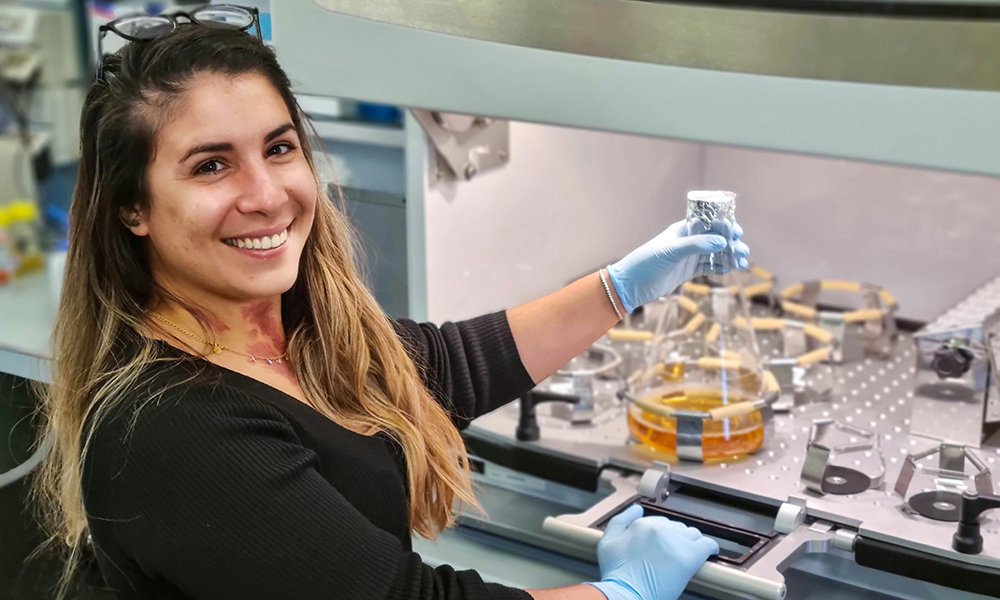
We are EMBL: Adriana Castillo Caballero on multicultural science and creativity
Adriana Castillo Caballero talks about her curiosity-driven career, the importance of the people in her life, and her dreams for the future

One of EMBL’s distinctive features is the multinational and multicultural nature of its staff, which creates a stimulating environment from both a scientific and a social perspective.
Adriana Castillo Caballero joined the Genetic and Viral Engineering Facility (GAVEF) at EMBL Rome as a technical officer in 2019. She was born and raised in Havana, Cuba, and had never left her country before. Coming to EMBL was a completely new and exciting experience: taking a plane, a metro train, and even seeing a cup of cappuccino come out of a vending machine for the first time.
Today, she is fully integrated in Italy, although she keeps her Latin-American spirit alive: her days, even at work, are always accompanied by the music of her country and lunch is an opportunity to gather with Spanish-speaking colleagues.
At what age did you decide you wanted to work in science, and what triggered that?
I was a very curious and creative child. My parents always tried to nurture all my interests and inclinations, like music and arts. But when I was 15, my grandfather got cancer, and I decided that I wanted to become a scientist and find a cure for cancer. My parents, who are both scientists, helped me find the most creative branch of science, which is – in my opinion – biochemistry and molecular biology. Eight years later, I ended up working at the Center of Molecular Immunology in Cuba, taking care of cell-line development for the large-scale production of recombinant monoclonal antibodies and proteins, primarily used for cancer and immune therapies. That experience was extremely emotional and rewarding, as we used to meet the patients receiving our therapies and I could see the direct impact of my work.
With that, I had achieved a professional goal and closed a circle, but my curiosity led me to seek more, and I took the difficult decision to leave Cuba. My parents were not happy to see me leave, but when I received the job offer from EMBL, they made incredible efforts to support me and help me complete all the bureaucratic and logistical procedures.
What’s the best part of working at EMBL?
EMBL gives you access to state-of-the-art technologies, and that was a strong motivation for me, considering that I came from a country where science is strongly encouraged but has developed in difficult and disadvantaged conditions. But the best part of EMBL for me is the people, and the sense of community that I have found here. I met many colleagues coming from other countries; we share the same excitement and motivation but also the same problems. We spend a lot of time together outside of work as well, and for me this has been a very enriching social experience. I’ve learned how to interpret people’s behaviours based on their culture, and I’ve also changed my behaviour to be more respectful to other cultures.
I’ve also appreciated the importance EMBL places on mental health. I received a lot of support at a delicate time in my life that was enhanced by the COVID-19 pandemic, and now I realise how important it is to work in a healthy mental state, especially for someone emotional and sensitive, like me.
What do you think is the most exciting thing about your work?
For me, it’s the creative aspect, when you try to model a scientific process and need to develop hypotheses and test them. In the Genetic and Viral Engineering Facility, we generate DNA constructs and viral vectors to modify the cell genome to address specific questions. It is a very delicate process that requires a lot of study and caution because you alter natural processes, but at the same time, it is also extremely creative and exciting.
Sometimes, I go to the seminars presented by EMBL Rome scientists who use the products that we generate, to see where our work ends up and what is the impact of what we do as a service. I really enjoy seeing the application of my work.
What has been the biggest challenge in your career thus far, and how did you overcome it?
Moving to Italy has been very challenging: getting used to a new country, a new language, and a new culture. Less than a year after I moved here, when I was just starting to feel more confident, the pandemic broke out and made things even more difficult. We had to adapt to the ‘new normal’ and to remote working, and so many friends left for their home countries. I really suffered from the isolation; but some people have been instrumental in helping and supporting me through this difficult time.
How do you see your work evolving over the next few years?
At some point in my career, I would like to be able to reconnect with the Cuban Institutes and the mentors that contributed to my education and allowed me to be where I am now. My dream is to establish my own service start-up to collaborate with those Institutes and promote networking with other partners to support their research. CRISPR technology, for example, would allow us to accelerate and improve local processes and productivity, and has a great potential to optimise cell-based therapies. I would like to make use of all the experience I’ve gained and the connections that I’ve established through EMBL.


